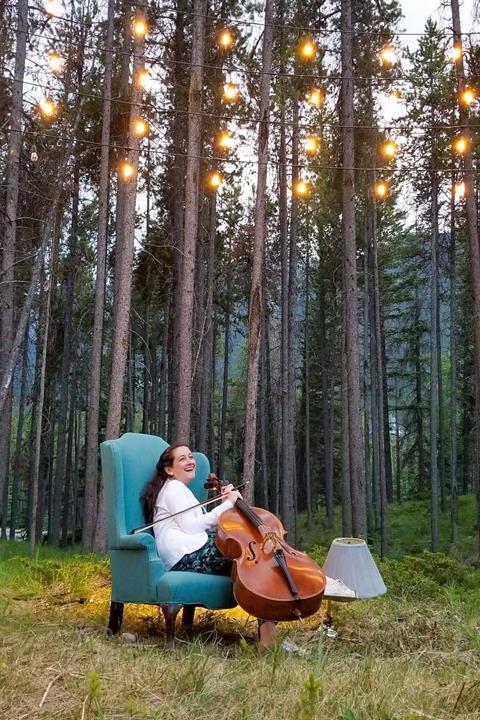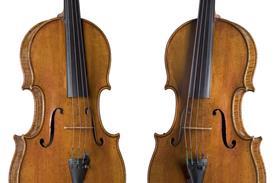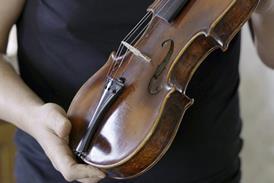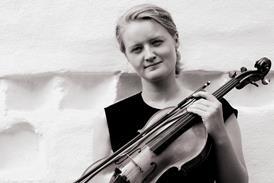Musicians are in a unique position to make a difference in the face of climate and ecological breakdown, writes cellist Sophie Gledhill

It’s easy to look at the news of climate and ecological breakdown, feel overwhelmed by the scale of the crisis and then resign ourselves to helplessness in our capacities as musicians. But there are always things we can do and, as musicians, we can choose to recognise our unique position to make a difference.
Be yourself and play to your strengths
If you’re open and vocal about your interests and the causes you care most about, the ‘right’ projects often have a way of finding you. As a cellist who is passionate about the environment and working in theatre, it perhaps wasn’t a coincidence that I found myself in the cast of a new production in 2016 called Opera for the Unknown Woman, an eco-feminist multimedia piece of theatre which explored the importance of international and inclusive collaboration in tackling the environmental crisis. Engaging with these issues in this way has also had a lasting effect on me long after the final show of the tour.
Last summer I was invited to be a coach at Festival of Chapels, a chamber music course in the Swiss Alps - near the shrinking Aletsch glacier - with a focus on appreciating and protecting the natural environment.
During lockdown I launched my own project, CelloTrek: my ongoing mission to record a piece of music from every country in the world in order to shine a light on a sustainability issue in each place. The more research I do, the more I realise that environmental and cultural sustainability are inextricably linked and, if we destroy our natural surroundings, we also destroy the places where unique cultures are born, grow and thrive.
Why am I reeling off my work diary and pandemic activities? A quote from Howard Thurman neatly summarises my thoughts: ’Don’t ask yourself what the world needs. Ask yourself what makes you come alive, and go do that, because what the world needs is people who have come alive.’ We can make the most positive impact when we are inspired, driven and putting our individual skillsets to use.
Don’t ask yourself what the world needs. Ask yourself what makes you come alive, and go do that, because what the world needs is people who have come alive - Howard Thurman
Look after the little things
As musicians on the go, there are choices we can make on a daily basis which can minimise our impact on the planet, such as taking the train over flying and opting for a plant-based diet. While it can feel like our individual actions can’t possibly count for much, and while we know that governments and corporations have a staggering amount of urgent work to do, I always try to imagine my actions being multiplied by the number of people on our planet; 7 billion people eating sustainably grown plants over methane-producing cows suddenly feels significant.
There are also one-off or less regular individual actions we can all take as consumers, such as switching to an ethical bank (such as Triodos) and rejecting fast fashion - either by buying secondhand clothes or choosing sustainable brands. I often check the Ethical Consumer website to find out which brands and services are most environmentally sound.
On an artistic front, it can sometimes feel selfish or pointless to focus all our energy on one rehearsal or concert when news of impending environmental (and other) doom is unfolding around us. But something I heard during the COP26 conference, spoken by young Indonesian delegate Mustika Indah Khairina, has stuck with me: ’You can’t tell youth to have hope. For hope, they need inspiration. And for inspiration, they need culture.’ Your concert may well provide the impetus that someone needs to take their own brand of action.
You can’t tell youth to have hope. For hope, they need inspiration. And for inspiration, they need culture - Mustika Indah Khairina
Build your network
In 2018 I was a cohort member of the Global Leaders Program, a masters-level certificate for musicians looking to explore impact-focused arts entrepreneurship. While I learnt a great deal about the potential of music as a catalyst for social change and the practical tools needed to launch a socially motivated music initiative, one of the major takeaways from this chapter of my life was the network of people I met along the way.
Fast forward to the first Covid lockdown of 2020 and I found myself organising the Toki Rapa Nui Global Support Campaign, a crowdfunder to support the environmentally sustainable music school on Easter Island where I spent two weeks for my Global Leaders Program fieldwork. I was overwhelmed by the solidarity shown by fellow GLP alumni - from New Zealand to Peru - who came together to perform in the campaign video, lend other expertise and help to spread the word. Surrounding yourself with likeminded people can inspire and propel your next earth-conscious actions.
Remember that you’re not just a musician
You’re a human that plays music. Not everything you do has to be tied to your identity as a musician, however important that facet of your life may be.
In November 2021, just before joining the Les Misérables UK tour in Glasgow, I was fortunate to be able to take three days to volunteer at COP26, the annual climate change conference hosted by the UN. It was refreshing and empowering to leave my cello in its case, throw on a ‘DEMAND CLIMATE JUSTICE’ T-shirt courtesy of the COP26 Coalition and unite behind a common cause without having to remember where I’d left my rosin. We know music can be a powerful tool for change, but it doesn’t have to be the only tool in our box.
Jump on bandwagons
While there can be great value in taking control and crafting your own projects in line with your skills and interests, it’s always worth looking around to see what already exists and could be strengthened by your contributions. I’d recommend reading Tamsin Omond’s recent book Do Earth: Healing Strategies for Humankind, which shares a decade’s worth of wisdom about collective action and community engagement.
A great place to start is Music Declares Emergency, a group of music industry individuals and organisations calling for immediate governmental action to protect our planet. Check out their website and social media to see how you can get involved.
Also head to Harmonic Progression, a place for classical musicians looking for ways to do good for people and planet. You can join one of their campaigns or take on a task, including donating any unwanted strings through their Strings4All initiative.
Embrace the power of conversation
When work and life take over, especially as the performing arts industry returns to some kind of ‘normal’ following a string of lockdowns, it can feel like we have limited time, space or resources for meaningful engagement with environmental issues. But I am coming to realise that good old-fashioned conversation, as well as the example of our actions, can have a ripple effect beyond what we might initially assume; there’s certainly been an increase in vegan food experimentation within the Les Mis touring orchestra, in any case!
In short, if there’s anything I’ve learnt from my engagement with environmental issues and activism over the past few years, it’s that doing something is always better than nothing, no matter how small. (If nothing else, I plant a tree once a day through an app appropriately called treeapp.) And, as musicians, it pays to remember that we have have readymade audiences and platforms at our disposal; let’s make them count.
Sophie Gledhill is a London-based freelance cellist and currently holds the cello chair on the Les Misérables UK and Ireland tour. Find out more about CelloTrek here.
Listen: The Strad Podcast Episode #42: Kerenza Peacock on environmental awareness and musical connection
Read: 5 top tips for string players to live a more eco-friendly life
Analysis April 2022: Seeing the wood for the trees
- 1
- 2
 Currently reading
Currently readingFeeling powerless as a musician in the face of the climate crisis? 6 ways to take positive action
- 3
- 4
- 5
- 6
- 7
- 8
- 9
- 10











































No comments yet